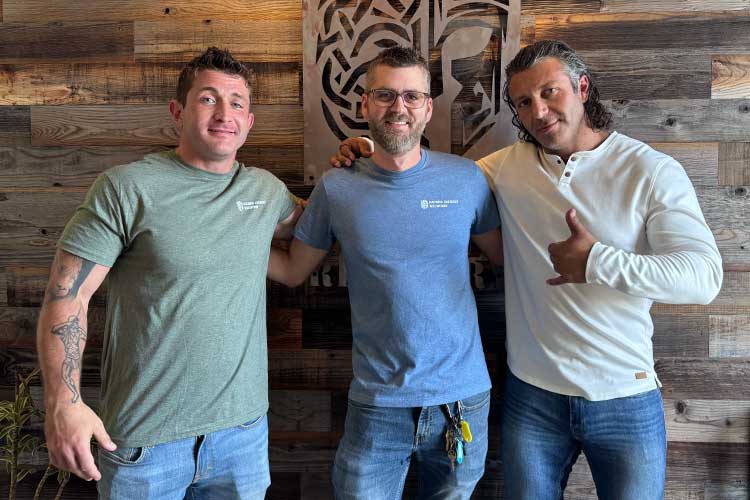Quick Summary
Withdrawal from drugs or alcohol typically unfolds in three stages: the anticipation phase in the first few hours marked by restlessness and cravings, acute withdrawal from 12 to 72 hours with intense physical symptoms like nausea and muscle pain, and the adjustment phase from days 4 to 7 when physical symptoms ease but psychological challenges like fatigue and mood swings become more pronounced.
Withdrawal can be dangerous and may involve life-threatening complications such as seizures or delirium tremens, especially with opioids or alcohol.
Men often face unique challenges during withdrawal including social conditioning that discourages seeking help, more intense cravings, and lack of emotional coping skills, making medically supervised treatment important for safe recovery.
Key Takeaways
- The first stage of withdrawal occurs within hours of stopping drug use and is characterized by restlessness, anxiety, irritability, sweating, headaches, and intense cravings that can lead to relapse without proper support.
- Acute withdrawal from 12 to 72 hours after last use brings the most intense physical symptoms including nausea, vomiting, muscle pain, tremors, and potentially dangerous complications like seizures or delirium tremens that require medical supervision.
- Research suggests that men may experience more intense cravings for substances than women and often face barriers to seeking help due to social conditioning around vulnerability, which can increase their risk of relapse.
- Post-acute withdrawal symptoms including intermittent cravings, emotional instability, sleep problems, and mood swings can persist for weeks or even months as the brain works to repair neurotransmitter systems affected by prolonged drug use.
First Stages of Withdrawal
When a man decides to quit using drugs, his body and mind go through a difficult transition. The first stages of addiction withdrawal can be intense, unpredictable, and sometimes dangerous. While the exact symptoms of withdrawal will vary depending on the substance and the severity of addiction, men often face unique challenges during the withdrawal period that may require specialized treatment.
Sacred Journey Recovery is a men-only addiction treatment center that is committed to providing compassionate, holistic care. We integrate evidence-based therapies, spiritual exploration, and experiential therapy so that clients can get the full benefit of nature’s restorative power. We empower men to break free from addiction and rediscover their purpose.
Before we talk about how Sacred Journey Recovery’s programs help men overcome substance abuse, we need to explore the unique challenges men face when it comes to withdrawal. Knowing what to expect from this stage of recovery will help you in your fight against addiction.
Understanding Addiction Withdrawal
Withdrawal is the body’s way of reacting to the sudden absence of a substance it has become dependent on.
Being unable to quit from a drug is not a sign of weakness, repeated drug use alters brain chemistry to the point where it can’t function normally anymore without it. This is what characterizes drug addiction.
But withdrawal makes the situation even more intense by causing severe physical and mental health problems. When drug use stops, the body struggles to regain balance, leading to intense withdrawal symptoms. In some cases, withdrawal can even put your life in danger.
Studies suggest men are more likely than women to use illicit drugs at higher doses and for longer periods. Men also tend to develop a more intense physical reliance on substances.
If you want to break free from the cycle of substance abuse, you need to understand what to expect. Here are the first stages of withdrawal and what men can expect.
Stage 1: The Anticipation Phase (Hours After Last Use)
In the first few hours after stopping drug use, men often experience an intense physical and mental response as their body begins to crave the substance. This anticipation phase is mostly driven by changes in the brain’s reward system, particularly in dopamine regulation. Drug use creates a dependence on artificial stimulation. When the drug is suddenly removed, the brain struggles to restore normal function, leading to early withdrawal symptoms.
Men may feel restless, anxious, or irritable as their brain chemistry starts to adjust to the drug’s absence. Their body begins to react with mild physical symptoms like sweating, headaches, or an increased heart rate. They then begin to crave for the drug—these early cravings can be powerful, even causing obsessive thoughts about using again.
Men may also struggle to get some sleep, feeling an overall sense of unease. This phase can be particularly dangerous because the urge to use again is at its strongest. Relapse is highly likely. Without intervention and proper support, most men struggle to move past this stage.
Stage 2: Acute Withdrawal (12 to 72 Hours After Last Use)
The next stage is called the acute withdrawal phase. As the body works to purge the drug, men experience the most intense and physically demanding symptoms. The exact symptoms you experience may depend on the substance, but it can include nausea, vomiting, sweating, muscle pain, and tremors.
For men addicted to opioids or alcohol, this stage can also involve dangerous complications like seizures or delirium tremens (DTs), which cause confusion, hallucinations, and even life-threatening changes in heart rate and blood pressure.
Emotionally, men may feel extreme anxiety, depression, and even paranoia as their brain chemistry struggles to rebalance. With the drug removed from a man’s system, the central nervous system becomes hyperactive. This leads to a surge in stress hormones and neurotransmitter imbalances.
Without medical supervision, men can go through severe dehydration, heart complications, or even self-harm caused by severe depression.
Stage 3: The Adjustment Phase (Days 4 to 7)
By the fourth day, physical symptoms begin to ease, but this is typically when psychological withdrawal becomes more pronounced.
Many men experience extreme fatigue, lingering anxiety, and a deep sense of emptiness or loss. This is caused by the brain adapting to life without the drug. It can result in mood swings, irritability, and difficulty concentrating. Some even go through post-acute withdrawal symptoms (PAWS), where intermittent cravings and emotional instability persist for weeks or even months. Sleep problems, such as insomnia or vivid dreams, are also common during this stage.
During this phase, the brain is beginning to repair the damage caused by prolonged drug use. The neurotransmitter systems, particularly dopamine and serotonin, take time to recover, which can make men feel unmotivated or emotionally numb.
The exact duration of withdrawal may vary from one person to another. Some go through this recovery phase for a few weeks while others take months. It depends on the severity of addiction and other individual health factors.
Why Men Struggle with Withdrawal More Than They Expect
It’s easy to underestimate the impact of withdrawal if you have never experienced it. Drug and alcohol withdrawal are not only incredibly challenging, but they are also life-threatening in some cases. While withdrawal symptoms affect everyone differently, men often face unique obstacles that make the process even tougher. Here are some of those reasons:
Social Conditioning
Men are often raised with the expectation that they should handle difficulties on their own without showing vulnerability. This can make it harder for them to seek help or admit when they are struggling with withdrawal. Attempting to recover by isolating themselves only makes withdrawal more difficult.
Stronger Cravings
Research suggests that men tend to experience more intense cravings for substances than women. This makes withdrawal feel more overwhelming. These cravings can be both physical and psychological, increasing the temptation to relapse.
Higher Risk of Relapse
When men encounter stressful situations, they may turn back to illicit substances as a coping mechanism instead of seeking proper support. This is because they don’t want anyone to see them in a vulnerable state.
Since men are often less encouraged to express their emotions, they may struggle to find healthy outlets for the discomfort that comes with withdrawal.
Physical Withdrawal Symptoms
Men often have higher body mass and metabolism rates, which can factor into the development of more severe withdrawal symptoms. The intensity of these symptoms can make it even harder to push through the detox process.
Lack of Emotional Coping Skills
Because many men are not taught to process emotions in a healthy way, they may struggle to deal with the mood swings, anxiety, and depression that often come with withdrawal. Withdrawal can feel unbearable if you do not have the right tools for emotional regulation.
These reasons can make it that much more challenging for a man to recover, or even acknowledge that they need help. But understanding the treatment process for drug addiction and withdrawal can give you the information you need to take that crucial first step towards recovery.

How Sacred Journey Recovery Helps
This is where Sacred Journey Recovery comes in.
The first stages of withdrawal may be challenging, but they are temporary. Now that you know what to expect, you can start looking into ways on how to deal with it. Sacred Journey Recovery offers evidence-based treatment programs that are catered specifically towards men.
If you or someone you know is struggling with addiction, seeking medical support is important. Proper medical attention is necessary so that the patient can detox from the harmful substances while receiving care from trained medical professionals.
By taking small, consistent steps toward healing, men can regain control over their lives and break free from addiction for good.
Adventure-Based Recovery
Sacred Journey Recovery gives men the chance to rediscover their strength through fearless exploration and adventure-based recovery. We believe recovery begins outside the comfort zone. Our adventure-based approach pushes clients to their physical and mental limit, giving them the opportunity to develop the confidence they need to conquer addiction and start living a sober life again.
Rock climbing, indoor skydiving, and wolf therapy are only a few examples of how we use adventure therapy to push men forward, even when the path seems impossible. These outdoor adventures are just as much as building mental strength as it is about building physical resilience. After all, battling addiction requires both your mind and body to be in top form.
Men-Only Focus
There’s no denying that men face gender-specific challenges during the recovery process that need to be addressed with a specialized approach. Sacred Journey Recovery provides an environment where men can feel supported and comfortable enough to open up about the struggles that are keeping them addicted.
As a specialized men’s addiction treatment center, Sacred Journey Recovery helps men forge strong bonds with a brotherhood of men who can challenge each other, provide support, and hold them accountable.
Even throughout withdrawal, you don’t have to walk this path alone. Licensed counselors and fellow clients collaborate to foster a sense of community crucial for sustained sobriety. In this brotherhood, you can share victories, confront your struggles, and build a long-lasting bond of trust.

Acceptance of Bitcoin
In a pioneering move within the addiction treatment field, Sacred Journey Recovery accepts Bitcoin as a payment option. By embracing cryptocurrency, they offer added discretion, financial flexibility, and convenience, making it easier for clients to begin their recovery journey, even without traditional payment barriers.
Integrated Healing Approach
Beyond wilderness therapy for addiction treatment, Sacred Journey Recovery utilizes evidence-based therapies, including cognitive behavioral therapy (CBT) and group counseling. We recognize that winning the fight against addiction is not just about stopping substance use. Men should learn how to stay sober even when they are no longer under our care.
Our integrated healing approach helps make men more self-reliant while also learning the proper tools to stay on the path of healing, from coping mechanisms to learning about the community aspect of recovery.
Sacred Journey Recovery’s holistic and spiritual elements treat the whole person: it’s not just about healing them physically but also mentally and spiritually. We incorporate nature, mindfulness practices, and introspective work to nurture body, mind, and spirit.
Treatment Types
There is no one-size-fits-all solution to drug and alcohol addiction. Sacred Journey Recovery understands that every individual has a unique story. This is why we offer a wide range of services and multiple levels of care based on what patients need. Our flexible treatment plans combine evidence-based methods, holistic modalities, and spiritual exploration. This adaptability allows for the creation of a truly personalized path to healing. Here are some of the services we offer:
Residential / Inpatient Care: A structured, immersive setting that provides 24/7 supervision and a strong therapeutic community.
Partial Hospitalization Program (PHP): Ideal for those who need significant support during daytime hours while returning home or to supportive housing at night.
Intensive Outpatient Program (IOP): A step-down approach for men who are transitioning from residential treatment or those in need of intensive therapy without full-time residency.
Outpatient Services: For clients with milder issues or as ongoing support after more intensive treatment.
Relapse Prevention and Aftercare: Continuing guidance and accountability to help maintain sobriety and personal development over the long term.
Commitment to Lasting Recovery
By pairing professional expertise with genuine empathy, Sacred Journey Recovery ensures that men not only conquer the immediate challenges of addiction but also cultivate resilience and life skills that they can use once they are back in the real world.
Sacred Journey Recovery’s acceptance of Bitcoin underscores an innovative, forward-thinking commitment to helping every client access the care they need, however they choose to pay.
Join a Brotherhood That Inspires Strength and Accountability
At Sacred Journey Recovery, we create a foundation for lasting transformation by combining physical challenges, outdoor activities, trauma-informed care, and a brotherhood of accountability and trust. We guide men to overcome addiction by building resilience, confidence, and the proper tools for coping with withdrawal.
True transformation begins where comfort ends. At Sacred Journey Recovery, we forge a new path to healing by embracing challenges that test the mind, body, and spirit. Through fearless exploration, we help men break free from the chains of the past, overcome addiction, discover inner strength and a new sense of identity.



